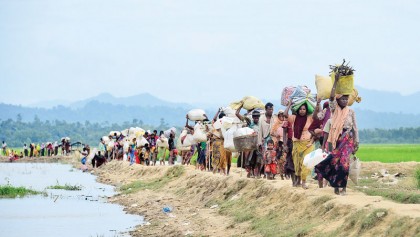
Staff Reporter: UN’s top court the International Court of Justice (ICJ) in the Hague of Netherlands is set to deliver an order today (Thursday) about the case of genocide against the Rohingyas in Myanmar.
It is in response to The Gambia’s seeking provisional measures to stop genocide in the Myanmar’s Rakhine state.
The ICJ is scheduled to begin delivering the order at Bangladesh time 3:00pm.
The Gambia filed the case with the ICJ, in November, took the legal step on behalf of the Organisation for Islamic Cooperation (OIC), which has held a series of meetings to encourage its 57 members to support the case.
Lawyers from The Gambia and Myanmar took part in the hearing held on December 10-12.
During the hearing, Justice Minister and Attorney General Abubacarr Marie Tambadou led the Gambian side, while the Myanmar side was headed by the country’s State Counsellor Aung San Suu Kyi, who has been widely criticised for her role in the Rohingya crisis.
The Gambia argued that Myanmar has been committing genocide against the Rohingya Muslim population living in Rakhine state. To prove its case, it cited reports by the UN Fact-Finding Mission and different global rights bodies.
About 750,000 Rohingyas fled a brutal military raid since August 2017 and took shelter in Bangladesh. They joined some 300,000 others who had fled previous waves of violence from Myanmar, where they have been denied citizenship since the 1970s and are deprived of basic rights like health and education, and freedom of movement.
More than 24,000 Rohingyas have been killed by Myanmar’s state forces since August 2017, according to a report by the Ontario International Development Agency, which involved researchers and organisations from Canada, Australia, Bangladesh, Norway and the Philippines.
More than 34,000 people were thrown into fire and more than 114,000 others were beaten up, the report said.
It also said 17,718 Rohingya women and girls were raped since the Myanmar army and police systematically targeted the world’s most persecuted group.
The UN termed it a classic example of ethnic cleansing, while an independent UN Fact-Finding Mission described the violence as having genocidal intent and demanded probing the senior military officers.
Though the UN repeatedly adopted resolutions condemning the atrocities by Myanmar, the UN Security Council could take no concrete actions against Myanmar to stop the genocide mainly due to opposition from the country’s close allies China and Russia.
The Gambian Justice Minister Tambadou, who worked for years as a lawyer at the UN tribunal that dealt with the 1994 genocide in Rwanda, assumed a position of leadership in the lawsuit because of his special expertise.
Both The Gambia and Myanmar are signatories to the UN’s Genocide Convention.
Lawyers for The Gambia also requested that Myanmar shall not destroy or render inaccessible any evidence related to the events described in the application.
On the other hand,Myanmar outright denied the allegations of genocide and ethnic cleansing, though it said its army used disproportionate force and committed crimes against the civilians during clearance operations in Rakhine since August 2017.

